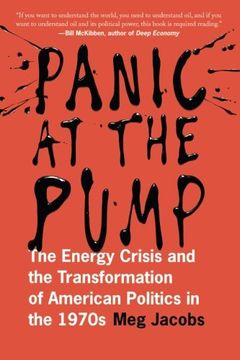Panic at the Pump: The Energy Crisis and the Transformation of American Politics in the 1970s (in English)
Synopsis "Panic at the Pump: The Energy Crisis and the Transformation of American Politics in the 1970s (in English)"
An authoritative history of the energy crises of the 1970s and the world they wrought In 1973, the Arab OPEC cartel banned the export of oil to the United States, sending prices and tempers rising across the country. Dark Christmas trees, lowered thermostats, empty gas tanks, and the new fifty-five-mile-per-hour speed limit all suggested that America was a nation in decline. "Don't be fuelish" became the national motto. Though the embargo would end the following year, it introduced a new kind of insecurity into American life--an insecurity that would only intensify when the Iranian Revolution led to new shortages at the end of the decade. As Meg Jacobs shows, the oil crisis had a decisive impact on American politics. If Vietnam and Watergate taught us that our government lied, the energy crisis taught us that our government didn't work. Presidents Nixon, Ford, and Carter promoted ambitious energy policies that were meant to rally the nation and end its dependence on foreign oil, but their efforts came to naught. The Democratic Party was divided, with older New Deal liberals who prized access to affordable energy squaring off against young environmentalists who pushed for conservation. Meanwhile, conservative Republicans argued that there would be no shortages at all if the government got out of the way and let the market work. The result was a political stalemate and panic across the country: miles-long gas lines, Big Oil conspiracy theories, even violent strikes by truckers. Jacobs concludes that the energy crisis of the 1970s became, for many Americans, an object lesson in the limitations of governmental power. Washington proved unable to design an effective national energy policy, and the result was a mounting skepticism about government intervention that set the stage for the rise of Reaganism. She offers lively portraits of key figures, from Nixon and Carter to the zealous energy czar William Simon and the young Donald Rumsfeld and Dick Cheney. Jacobs's absorbing chronicle ends with the 1991 Gulf War, when President George H. W. Bush sent troops to protect the free flow of oil in the Persian Gulf. It was a failure of domestic policy at home that helped precipitate military action abroad. As we face the repercussions of a changing climate, a volatile oil market, and continued turmoil in the Middle East, Panic at the Pump is a necessary and lively account of a formative period in American political history.

